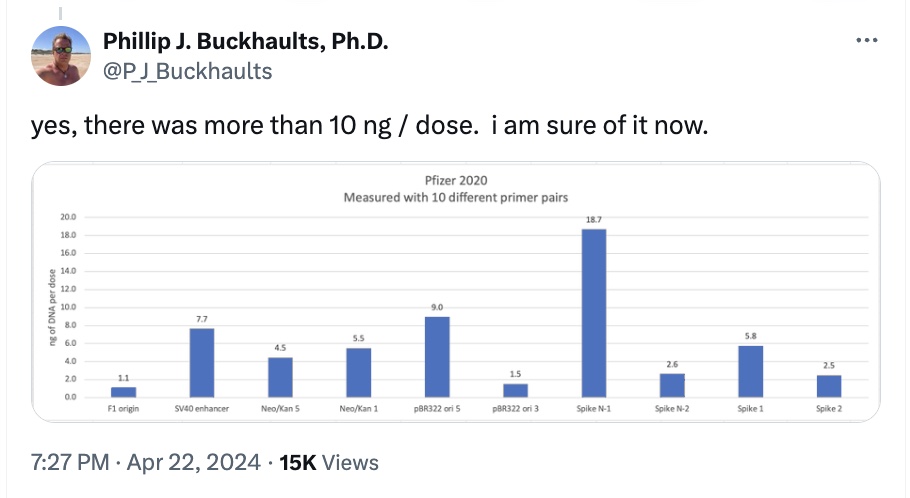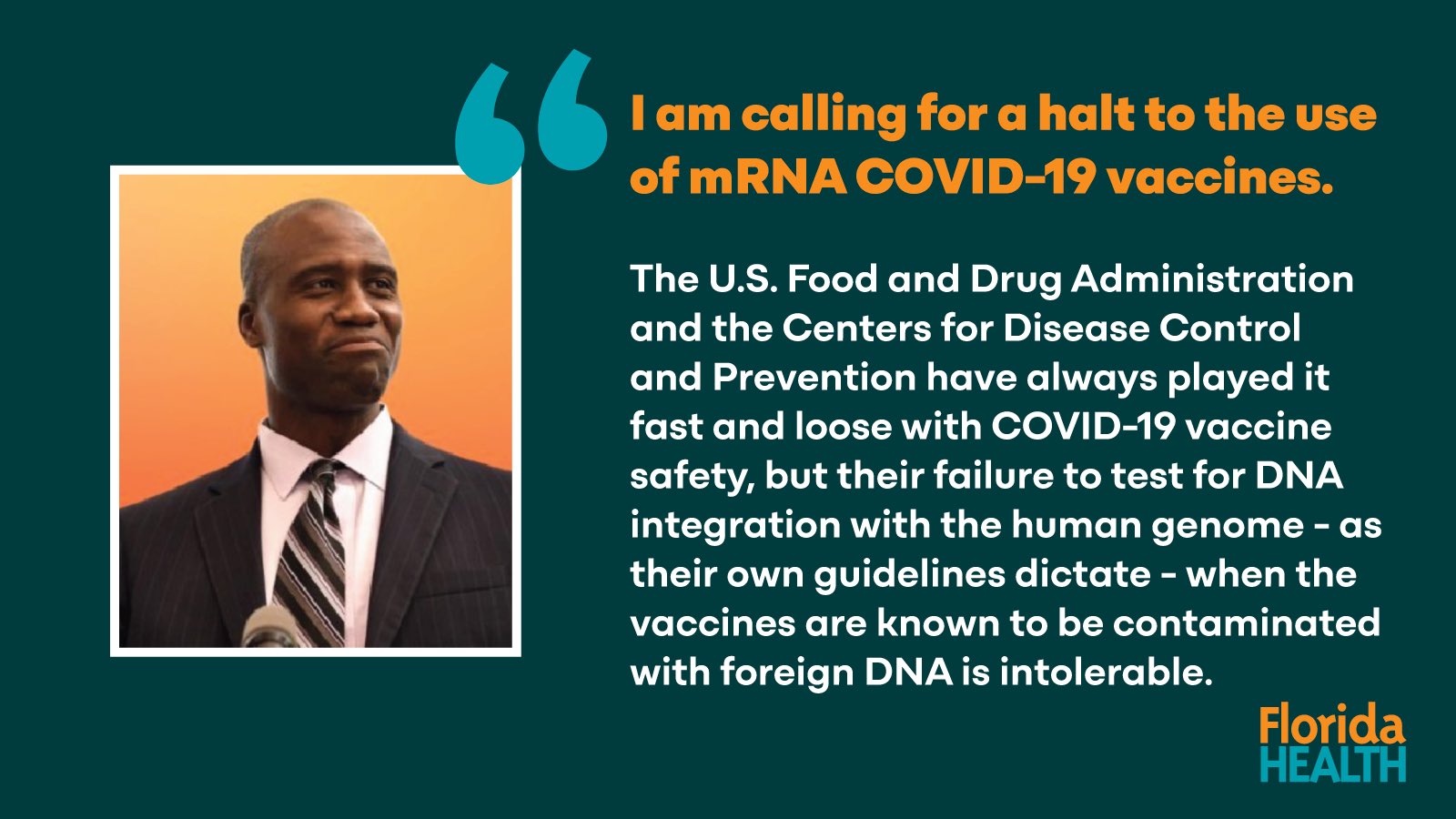Health Experts Raise Alarm: SV40 Enhancer in Pfizer/BioNTech Vaccines
Updated
Dr. Philip Buckhaults posted on X that the Pfizer/BioNtech mRNA vaccines contained more than the 10ng limit of the SV40 enhancer/promoter that Health Canada allowed. A new report by Epoch Times reveals that Pfizer knew about the presence of the SV40 enhancer but intentionally decided not to mention this fact to regulators upon submission of the vaccine for approval. They obtained this through an access to information request, the Canadian equivalent of a FOIA request.
The SV40 enhancer was referenced by Dr. Joseph Ladapo in his letter to the FDA asking for more information regarding the risks of DNA integration. Ladapo’s called to halt the vaccine use after the FDA failed to acknowledge the SV40 enhancer/promoter.
Ladapo stated, “The FDA’s response does not provide data or evidence that the DNA integration assessments they recommended themselves have been performed. Instead, they pointed to genotoxicity studies – which are inadequate assessments for DNA integration risk. In addition, they obfuscated the difference between the SV40 promoter/enhancer and SV40 proteins, two elements that are distinct.”
Dr. Kevin McKernan, a genomics researcher, authored a pre-print study in April 2023 that found higher levels of SV40 than regulations allowed. Dr. McKernan posted on X that “no prior vaccine in Canada has been approved with such a sequence contaminant.” He provided more context by saying “Pfizer assured them the sequence is not material to plasmid manufacturing. This is an overt lie. You cannot make plasmids without the promoter for the antibiotic resistance gene. It is active in mammalian cells. If it’s not needed, why is it in there?”
An NIH-funded study preprint in January 2024 states, “Our results argue that the ability of the SV40 enhancer to target somatic hypermutation (SHM) to large tumor antigen (LT) is a potential source of LT truncation events in various cell types that could contribute to carcinogenesis.” As a preprinted study, this has not been peer-reviewed.
On a recent appearance on The HighWire with Del Bigtree, Dr. Ladapo stated:
“With these mRNA vaccines, you’ve basically got a passport into human cells. So, whereas in the past, DNA would have a hard time ever getting into a cell, let alone getting into the nucleus of the cell, now you have these lipid nanoparticles that everyone is very excited about with the mRNA vaccines, that they carry mRNA in, but they almost certainly also carry DNA into the cells. So, it completely changes the risk analysis. And this risk, however low it may be, is one that the FDA has acknowledged in the past, and somehow they think that they can get away with not assessing this time, and it’s totally not gonna happen.”
The FDA guidance that Ladapo refers to states, “DNA integration could theoretically impact a human’s oncogenes, the genes that can transform a healthy cell into a cancerous one.” That possibility is confirmed by the preprint study published in January.
Dr. Laura Braden, a molecular biologist, spoke with the National Citizen’s Inquiry in Canada and talked about her concerns regarding the SV40 enhancer:
“SV40 is known to be an oncogene. It is used very effectively in gene therapy for insertion of elements into the genome. Because Health Canada was forced to admit that this was present, they went online and said, ‘don’t worry it’s inactive, it doesn’t work, it’s not going to be harmful to you.’ Which is another huge gaslight. That’s not accurate. It’s completely false. ”
Dr. Buckhaults research results posted on X show a chart of different primer pairs. The Spike N-1 shows 18.7 ng per dose. Dr. Buckhaults preceded this graph by stating this is an underestimation, because he is assuming no fragmentation, “which we know not to be true. Most targets will in fact be cut and therefore invisible, but for now the tallest bar is a lower estimate.”
Dr. McKernan followed up his post by saying “Regulators are asking for their PCR protocol. That means they have performed ZERO checks on this DNA contamination themselves and are entirely relying on the word of the manufacturer. They look at the Fluorometry data as well ask why 2 diff methods?”
Health Canada, the FDA, and the European Medicines Agency have all admitted that they were unaware of the DNA fragments in the vaccines. These health agencies continue to deny that the DNA fragments can have any impact. Health Canada states that “The fragment is inactive, has no functional role, and was measured to be consistently below the limit required by Health Canada and other international regulators.”
Dr. Braden disagrees with this analysis, saying, “This SV promoter is actually not inactive. It is very much active and it binds to a gene called p53, which is a tumor suppressor in people. This is interacting intimately with the cancer process in humans. The sv40 can interact with this particular gene called p53 and if it does so there is a massive concern for oncogenesis. Because that particular gene is a tumor suppressor gene. Sv40 was omitted from the original plasmid map. The only reason we know about it is because we did the work.”
Dr. Buckhaults provided further context by stating “The 10ng limit is not appropriate for LNP encapsulated DNA. as far as I know there have been no safety studies for this situation. it was not possible because of the abbreviated timeline during the emergency you saw authorization. But now that we are no longer under an emergency, long-term safety studies would be very appropriate.”
The 10ng limit was made for non-mRNA vaccines and not appropriate for vaccines that use lipid nanoparticles. Dr. Buckhaults said he was happy to see low levels of DNA in the Moderna vaccine. His test results show that the new Moderna vaccine is 20,000 times cleaner than the old Pfizer vaccine in terms of the amount of DNA particles per dose.
Health regulators continue to downplay the relevance of this information. Dr. Dean Smith is a senior evaluator in Health Canada’s Vaccine Quality Division. The Epoch Times access to information request recovered an email he wrote to a colleague at the FDA that said the presence of SV40 fragments is not an “urgent risk” issue. Dr. Smith was more concerned with how the news regarding the fragments could deter the public from getting vaccines in the fall of 2023 and beyond.
Dr. Smith and Dr. Wu, A Health Canada Senior Biologist, both came to the conclusion that they should not notify Pfizer of their communications with the FDA and EMA regarding the SV40 enhancer. These researchers and scientists felt the need to communicate concerns regarding the SV40 enhancer. Regulators communicated with other agencies about the same concerns. Despite this, the overwhelming message from the health agencies is that the SV40 DNA fragments have no functional role and are not a safety concern.













